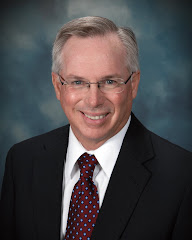The Energy Bill
The Kansas House of Representatives will take up debate this week on HB 2014, commonly referred to as the Energy Bill. The bill is a far-reaching initiative, and represents many hours of testimony, debate, and compromise in the House Energy Committee. The bill addresses issues surrounding development of renewable energy sources and expansion of energy conservation efforts. It also addresses the recurring issue of whether the Sunflower Holcomb power plant should be allowed to expand. I have some thoughts that I would like to share regarding the proposed Sunflower Holcomb expansion:
The coal vs. renewables debate. Although we all recognize the value in moving toward greater use of renewable energy sources, for the foreseeable future the only reliable and cost effective alternative for baseload (24/7) generation is coal. It has been estimated that a million wind generators would address only 1/7 of our nation's future energy needs, and would require completely covering an area larger than all of West Virginia, Pennsylvania and Ohio with wind generators. Wind is available less than 40% of the time, and is usually absent when it is really needed on hot summer days. No reliable methods of storing wind energy for later use have yet been commercialized. The feasibility of future development of wind energy in Kansas will depend on an expanded transmission network to move this energy output to the end user. Development of that network is dependent on the construction of the Holcomb expansion.
It would be incorrect to infer that Sunflower Electric Coop is not dedicated to the development of renewable energy. Sunflower receives a greater percentage of its total generation capacity from renewable sources than any other power company in Kansas. In addition, the bioenergy center which is proposed as a component of the Holcomb project would represent a far-reaching and innovative advance in bioenergy production. Please note that contrary to recent rumors, the bioenergy center is still planned as an integral part of the expansion, as confirmed to me today by a high ranking official at Sunflower.
Wouldn't allowing the Holcomb expansion set Kansas apart as unwilling to address the problem of global warming? China is building 71 power plants per year the size of the proposed Sunflower plants. Closer to home, our neighbors are proceeding with constructing the following coal-fired electric generating plants:
Texas, seven plants, 4165 MW total capacity
Missouri, two plants, 1150 MW total capacity
Nebraska, two plants, 883 MW total capacity
Colorado, one plant, 750 MW total capacity
Arkansas, one plant, 665 MW total capacity
Wyoming, two plants, 522 MW total capacity
Iowa, two plants, 167 MW total capacity, and finally
Illinois, home of President Barack Obama, one plant, 250 MW total capacity.
It is apparent that denying construction of the Holcomb expansion would set Kansas apart on a fool's errand of trying to solve the problem of global warming all by itself, to the detriment of Kansas residents and energy consumers.
Why not size the Holcomb expansion to only meet the needs of Kansas consumers? There are economies of scale, and in the construction of coal fired plants it is important to size the plant for optimum construction and operational efficiency. The immediate needs of Holcomb customers can be met with a 200 MW expansion, but that size plant could not be constructed as cost-effectively nor operated as efficiently as a 750 MW plant. In addition, the construction of additional transmission lines to access both the Eastern and Western grids would not be as feasible with smaller plants. The construction of two 750 MW plants meets the needs of all three partners in the construction, and the development fees paid by Golden Spread and Tri-State to Sunflower provides Sunflower the capital needed to finance its portion of the project.
In other industries the production of product for export is viewed as a good thing. Kansas regularly exports a substantial portion of many of the products it produces, including Garmin GPS, airplanes, beef, wheat, and milk. Why should export of energy be viewed any different?
Isn't the economic benefit only the short-term effect of the construction? The benefit of the power plant construction will indeed be substantial, representing more than 2400 jobs created, annual payroll of more than $78 million, and increased tax collections of more than $9.3 million. Certainly this should be important at a time when new construction housing permits in Overland Park have dropped from 120 in January 2008 to one in January 2009. But the real economic benefit from the expansion will be the long-term presence of the expanded plant, bringing with it more than 300 full-time jobs, an annual payroll of more than $16 million, and most importantly, assured competitive energy costs for Sunflower consumers for the foreseeable future. The economy of rural Kansas continues to struggle, and I ask you to reflect on the effect that dramatically higher energy costs would have on a region that presently struggles with property tax mill levies that are unheard of in Kansas' urban centers. Here are some examples: Leoti, 215.0 mills; LaCrosse, 202.1 mills; Dighton, 188.7 mills. Far too often, discussions about economic development for rural Kansas produce little more than rhetoric. The vote on HB 2014 represents an opportunity to get serious about addressing a portion of the problem. The Holcomb expansion is as important to the economy of Western Kansas as the National Bio Agro Defense Facility, Ft. Riley expansion, or Kansas Speedway/Legends are to Eastern Kansas. Western Kansas must not be denied its chance to prosper.
Economic benefit to Kansas will also be enhanced by addressing the problem of regulatory uncertainty created by Secretary Bremby's denial of Sunflower's permit. Kansas has already lost out on billions in new development over and above the Sunflower expansion as a result of his denial, and Bremby's recent pronouncement that his denial is only targeted at new energy plant construction only illustrates the arbitrary nature of his original decision. This makes the task of attracting new business to Kansas exceeding difficult and will only be resolved by enacting HB 2014.
We are embarking on a new path to meet Kansas' future energy needs, and HB 2014 represents a balanced, responsible approach to meet that need. HB 2014 recognizes that the solution cannot be one-dimensional, and that a headlong push to renewables too rapidly would be counter-productive by raising rates too high too fast, thereby disadvantaging Kansas electric consumers. I will be voting Yes on HB 2014, and encouraging my colleagues in the House to join me in that vote.





No comments:
Post a Comment